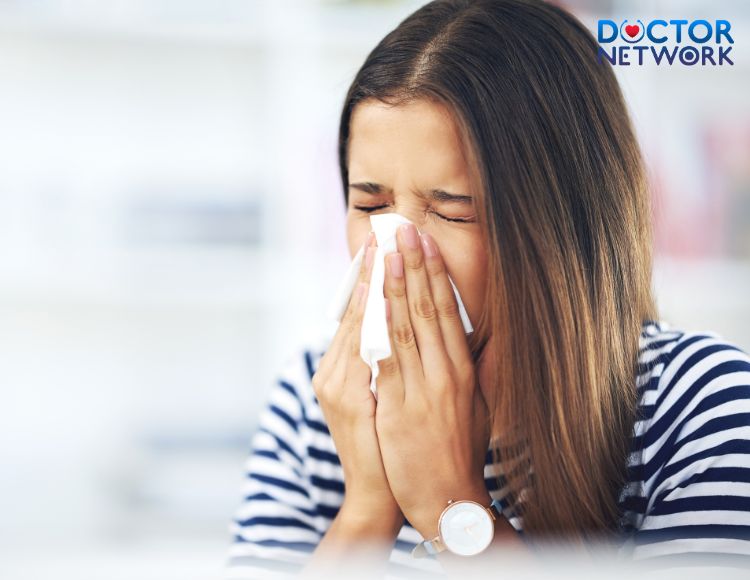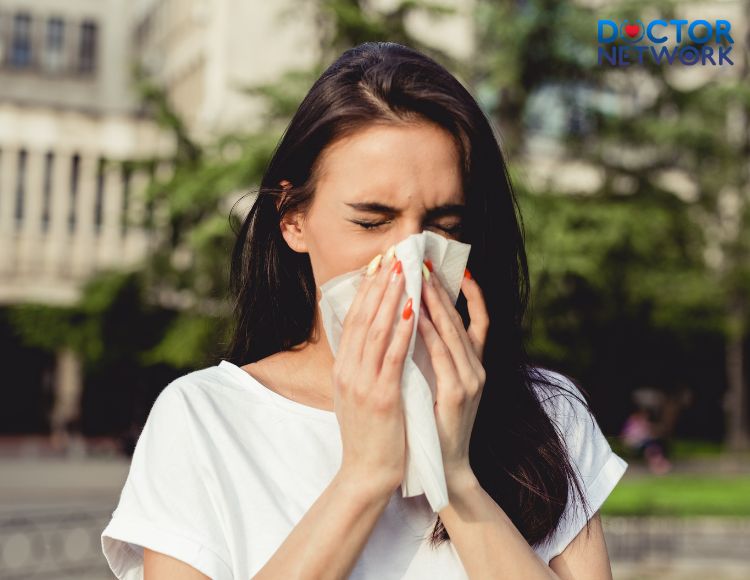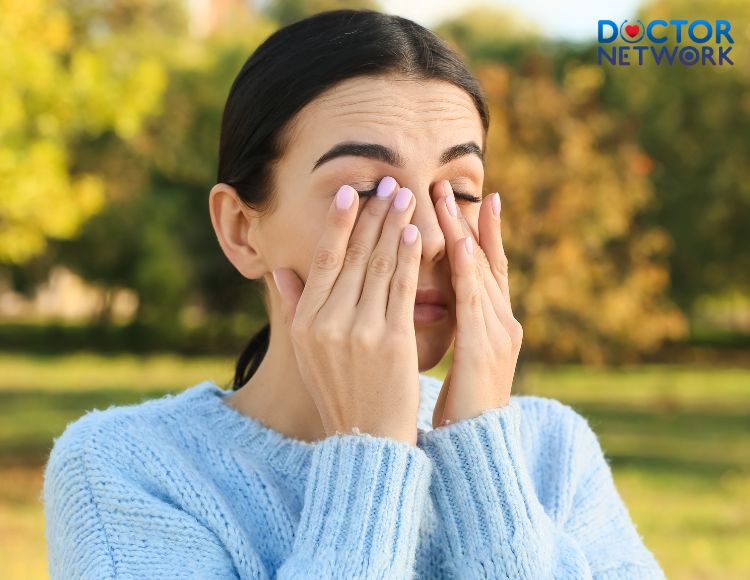Weather allergies, also known as seasonal allergies, can wreak havoc on your daily life. These hypersensitive reactions occur when your immune system overreacts to environmental triggers like pollen, mold, or dust mites. As the seasons change, millions of people experience symptoms ranging from mild discomfort to severe respiratory issues. This comprehensive guide will explore “tips to treat weather allergies at home“, preventative measures, and when to seek professional help for managing weather-related allergies effectively.
Understanding Weather Allergies: Causes and Symptoms
Weather allergies strike when environmental conditions fluctuate, causing allergens to become airborne. Common triggers include:
- Tree, grass, and weed pollen
- Mold spores
- Dust mites
- Changes in temperature and humidity

Weather allergies strike when environmental conditions fluctuate, causing allergens to become airborne
Recognizing the symptoms is crucial for timely intervention. Here’s a table outlining common weather allergy symptoms:
| Mild Symptoms | Moderate Symptoms | Severe Symptoms |
|---|---|---|
| Sneezing | Persistent cough | Difficulty breathing |
| Runny nose | Sinus pressure | Chest tightness |
| Itchy eyes | Fatigue | Swelling of face or throat |
| Nasal congestion | Headaches | Dizziness or fainting |
Effective Home Remedies for Weather Allergy Relief
Over-the-Counter Medications
When pollen counts soar, over-the-counter (OTC) medications can provide quick relief. Consider these options:
- Antihistamines: Cetirizine, Loratadine, Fexofenadine
- Nasal corticosteroids: Fluticasone, Mometasone
- Decongestants: Pseudoephedrine, Phenylephrine
- Eye drops: Olopatadine, Ketotifen
Natural Remedies: Harnessing Nature’s Power
For those seeking alternatives to pharmaceuticals, several natural remedies can alleviate allergy symptoms:
- Saline nasal sprays: Flush out allergens and moisturize nasal passages
- Neti pot: Gently irrigate sinuses to remove irritants
- Warm compresses: Reduce eye itchiness and inflammation
- Raw local honey: May help build immunity to local pollen (consume 1-2 teaspoons daily)
- Ginger tea: Boast anti-inflammatory properties to ease congestion
Lifestyle Changes: Creating an Allergy-Free Environment
Implementing these lifestyle modifications can significantly reduce allergen exposure:
- Keep windows closed during peak pollen season
- Use HEPA air purifiers in bedrooms and living areas
- Shower and change clothes after outdoor activities
- Wash bedding weekly in hot water (130°F or higher)
- Maintain indoor humidity below 50% to discourage mold growth

Maintain indoor humidity below 50% to discourage mold growth
Preventative Measures: Staying One Step Ahead
Identifying Your Triggers
Knowledge is power when it comes to managing weather allergies. Consider these strategies:
- Keep a detailed symptom diary to track allergy patterns
- Schedule an appointment with an allergist for comprehensive testing
- Monitor local pollen forecasts and plan accordingly
Avoiding Triggers: A Proactive Approach
Minimize exposure to allergens with these expert tips:
Stay indoors on high pollen count days, especially between 5 AM and 10 AM
Wear a high-quality mask (N95 or equivalent) when outdoor activities are unavoidable
Use dust mite-proof covers on mattresses, pillows, and box springs
Vacuum carpets and upholstery weekly using a HEPA filter vacuum cleaner
Remove shoes at the door to prevent tracking in outdoor allergens

Remove shoes at the door to prevent tracking in outdoor allergens
When to Seek Medical Attention: Recognizing Red Flags
While many weather allergies can be managed at home, certain symptoms warrant immediate medical attention. Watch for these warning signs of severe allergic reactions:
- Difficulty breathing or wheezing
- Rapid swelling of the face, lips, or tongue
- Widespread hives or itching
- Nausea, vomiting, or fainting
Consult an allergist if you experience:
- Persistent symptoms despite home remedies
- Suspected asthma or other underlying conditions
- Interest in long-term solutions like immunotherapy (allergy shots)
Supportive Tips for Managing Allergy Symptoms
Enhance your body’s natural defenses against allergens with these holistic approaches:
| Strategy | Benefit | Implementation |
|---|---|---|
| Proper hydration | Thins mucus, improves drainage | Drink 8-10 glasses of water daily |
| Adequate sleep | Boosts immune function | Aim for 7-9 hours nightly |
| Stress management | Reduces symptom intensity | Practice meditation or deep breathing |
| Dietary considerations | May alleviate symptoms | Consider eliminating dairy, wheat, or sugar |
| Regular exercise | Strengthens immune system | Engage in moderate activity for 30 minutes daily |
FAQs about “tips to treat weather allergies at home”
How can I distinguish between weather allergies and the common cold?
Weather allergies and the common cold can share symptoms, but there are key differences:
- Duration: Allergies can last for weeks or months, while colds typically resolve within 7-10 days.
- Onset: Allergy symptoms often appear suddenly when exposed to triggers, while colds develop gradually.
- Nasal discharge: Allergies produce clear, watery mucus, whereas colds often cause thicker, yellowish mucus.
- Additional symptoms: Colds may include fever and body aches, which are uncommon in allergies.
- Itchiness: Allergies frequently cause itchy eyes, nose, and throat, which is rare in colds.
If you’re unsure, consult an allergist for accurate diagnosis and treatment.
What natural remedies are most effective for managing weather allergy symptoms?
Several natural remedies can help alleviate weather allergy symptoms:
- Nasal irrigation: Using a neti pot or saline nasal spray can flush out allergens and reduce congestion.
- Local honey: Consuming raw, local honey may help build tolerance to local pollen over time.
- Quercetin: This natural antihistamine found in onions, apples, and citrus fruits may reduce inflammation.
- Butterbur: Some studies suggest this herb can be as effective as over-the-counter antihistamines for allergic rhinitis.
- Steam inhalation: Adding a few drops of eucalyptus oil to hot water and inhaling the steam can help clear nasal passages.
Always consult with a healthcare provider before starting any new treatment regimen.
How can I allergy-proof my home to reduce weather-related allergy symptoms?
To create an allergy-resistant home environment:
- Install HEPA air purifiers in bedrooms and main living areas.
- Use allergen-proof bedding covers for mattresses, pillows, and duvets.
- Keep indoor humidity below 50% to discourage dust mite and mold growth.
- Vacuum carpets and upholstered furniture regularly with a HEPA filter vacuum cleaner.
- Remove shoes at the door to avoid tracking in outdoor allergens.
- Keep windows closed during high pollen count days and use air conditioning.
- Wash bedding weekly in hot water (130°F or higher) to kill dust mites.
Are there any dietary changes that can help reduce weather allergy symptoms?
While diet alone can’t cure allergies, certain changes may help manage symptoms:
- Anti-inflammatory foods: Incorporate omega-3 rich foods like fatty fish, flaxseeds, and walnuts.
- Probiotics: Fermented foods like yogurt, kefir, and sauerkraut may boost immune function.
- Vitamin C: Citrus fruits, berries, and leafy greens can help reduce histamine levels.
- Quercetin-rich foods: Onions, apples, and green tea have natural antihistamine properties.
- Spicy foods: Ingredients like cayenne pepper or horseradish can help clear nasal passages.
Some people find relief by eliminating common allergens like dairy, wheat, or sugar. Consider consulting a nutritionist for personalized advice.
When should I consider immunotherapy (allergy shots) for weather allergies?
Immunotherapy might be recommended if:
- Over-the-counter and prescription medications don’t adequately control your symptoms.
- You experience side effects from allergy medications.
- You want to reduce long-term use of allergy medications.
- Your allergies are interfering significantly with your quality of life.
- You have allergic asthma or are at risk of developing it.
Allergy shots, administered by an allergist, can provide long-term relief by gradually desensitizing your immune system to specific allergens. The treatment typically involves regular injections over 3-5 years. Sublingual immunotherapy (allergy tablets or drops) is another option for some types of allergies. Consult with a board-certified allergist to determine if immunotherapy is right for you and to develop a personalized treatment plan.
Scientific researches on “tips to treat weather allergies at home”
- “Intranasal corticosteroids versus oral H1 receptor antagonists in allergic rhinitis: systematic review of randomised controlled trials” by Weiner et al., published in the British Medical Journal (2004).
- This meta-analysis compared the effectiveness of nasal corticosteroids to oral antihistamines for treating allergic rhinitis.
- “Efficacy of saline nasal irrigation in the treatment of allergic rhinitis: A systematic review and meta-analysis” by Hermelingmeier et al., published in the American Journal of Rhinology & Allergy (2012).
- This study examined the effectiveness of saline nasal irrigation as a home remedy for allergic rhinitis.
- “Indoor environmental interventions and their effect on asthma outcomes” by Krieger et al., published in the Journal of Allergy and Clinical Immunology (2010).
- This review looked at various home interventions for reducing allergen exposure and their impact on asthma and allergy symptoms.
- “Probiotics in the management of atopic eczema” by Isolauri et al., published in Clinical & Experimental Allergy (2000).
- While focusing on eczema, this study explored the potential of probiotics in managing allergic conditions, which could be relevant to some weather-related skin allergies.
- “Effect of Honey on Nocturnal Cough and Sleep Quality: A Double-blind, Randomized, Placebo-Controlled Study” by Cohen et al., published in Pediatrics (2012).
- This study investigated the use of honey for cough relief, which can be a symptom of weather allergies.
- “Butterbur Ze339 for the treatment of intermittent allergic rhinitis: dose-dependent efficacy in a prospective, randomized, double-blind, placebo-controlled study” by Schapowal et al., published in Archives of Otolaryngology–Head & Neck Surgery (2004).
- This research examined the effectiveness of butterbur, a herbal remedy, for treating allergic rhinitis.
Conclusion: Empowering You to Breathe Easier
Weather allergies can be challenging, but armed with these expert tips and home remedies, you can significantly improve your quality of life. Remember, everyone’s allergy profile is unique, so what works for one person may not be as effective for another. Be patient and persistent in finding the right combination of treatments for your specific needs.
By implementing these strategies and staying vigilant about your triggers, you can minimize the impact of weather allergies on your daily life. Don’t hesitate to consult with healthcare professionals for personalized advice, especially if your symptoms persist or worsen. With the right approach, you can enjoy the changing seasons without dreading the allergic reactions they may bring.
References:
https://www.barnesandnoble.com/w/holistic-gemz-keisha-christian/1138250131?ean=9781732578814
Kiểm Duyệt Nội Dung
More than 10 years of marketing communications experience in the medical and health field.
Successfully deployed marketing communication activities, content development and social networking channels for hospital partners, clinics, doctors and medical professionals across the country.
More than 6 years of experience in organizing and producing leading prestigious medical programs in Vietnam, in collaboration with Ho Chi Minh City Television (HTV). Typical programs include Nhật Ký Blouse Trắng, Bác Sĩ Nói Gì, Alo Bác Sĩ Nghe, Nhật Ký Hạnh Phúc, Vui Khỏe Cùng Con, Bác Sỹ Mẹ, v.v.
Comprehensive cooperation with hundreds of hospitals and clinics, thousands of doctors and medical experts to join hands in building a medical content and service platform on the Doctor Network application.


























